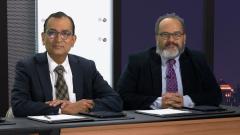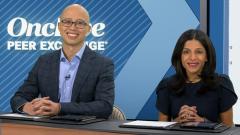
Advent of Molecular Testing in Biliary Tract Cancers
Key opinion leaders review the advent of molecular testing in biliary tract cancers and consider its impact on informing treatment decisionmaking.
Episodes in this series

Transcript:
Milind M. Javle, MD: Dr Shroff, now we have reached the diagnosis. We have reached a pathology diagnosis, we’ve had good imaging, and we’ve got staging. Clearly in the last 6 or 7 years, biomarker testing has revolutionized the field. What is your approach to biomarker testing? It seems like most of the drugs they have approved are in the second-line space. When do you do this biomarker testing? And before you get there, could you highlight what is biomarker testing, and what modalities do you employ for that situation?
Rachna Shroff, MD: Absolutely. Biomarker testing, I think is an absolute need in these patients as soon we approach a diagnosis. It basically comprises understanding the molecular markers, the drivers, the genetic aberrations that are acquired over the lifespan. To define a somatic mutation to my patients, I say, they are not the mutations you’re born with, but they’re the ones that you acquire over your lifespan that could have led to the progression and development of your cancer. Comprehensive biomarker testing is key.
We now know that we have multiple targets that we should and could be looking for with FDA-approved drugs in a number of different areas. And so, we don’t necessarily do what we did back in the day with breast cancer, where we just looked at 1 or 2 different markers. We’re trying to find a platform that enables a full span, and hopefully includes the ability to detect FGFR fusions. It’s really important to think through what the right panel is to make sure you’re catching all the potential targets that we know are very relevant in this disease. But I absolutely do biomarker testing when I meet the patient, at the time of diagnosis.
I will say it’s nice to see, I don’t know about you, Dr Javle, but more and more of my patients are coming to me referred and already having it ordered, which is really good to know. But unfortunately, not everybody is getting that. And because everything is approved in the second-line space, yes, but it does take time to get the biomarker testing done. So, in order to get that tissue in your hands, and then have it sent off for comprehensive testing, etc, I order it at the time of diagnosis, so I make sure I have that information ready to go when I need it.
Milind M. Javle, MD: Unfortunately, Dr Shroff, as you’re aware, there are challenges in this situation, right? There was a poster I saw yesterday at ASCO GI [American Society of Clinical Oncology Gastrointestinal Cancers Symposium], where it seems like the rate is still slightly above 50%. I think the TOPAZ-1 trial folks have done a wonderful job, because they have profiled about two-thirds of patients who are enrolled in the trial for next-generation sequencing. And I assume there are disparities in terms of who gets tested, and who has both patient disparities as well as tumor location and type. What is the next step here? How can we get to a majority of patients being profiled with the appropriate platform?
Rachna Shroff, MD: Yes, I think one thing that is a pivotal component to this is education. There’s been tremendous progress in that space, with partnering with the Cholangiocarcinoma Foundation, and advocacy, and helping patients recognize the need, so that you’re not only educating the physicians, but you’re also educating the patients. That way, if the physician isn’t thinking about it, hopefully the patient is coming to them and saying, “I need to get my biomarker testing done.” But I agree, there is absolutely going to be, and we’ve seen this in other diseases like lung cancer, where there are disparities in terms of access to this type of technology. I think understanding how we can ensure coverage of these, whichever modality we use for biomarker testing, is really important. I think we’re doing better at that as we have more therapies approved. But that’s going to be a very important part, as well as ensuring that the education we’re doing is reaching not just the academic medical centers and the specialized GI [gastrointestinal] oncologists, but the community oncologists who probably think to do it, hopefully, for lung cancer, but may not recognize the need to do it in cholangiocarcinoma.
Milind M. Javle, MD: Yes, even in my practice, I don’t know how you folks deal with perihilar cholangiocarcinoma, where you often don’t get a core biopsy to get enough tissue for next-generation sequencing [NGS]. I’ve been doing more and more liquid biopsies. Have you folks been considering that in your patients as well?
Rachna Shroff, MD: Yes, absolutely. The truth is the turnaround time is a little faster, too. So, it really helps.
Milind M. Javle, MD: I think the message I’m getting here from my colleagues is biomarker testing is critical. Using an appropriate platform is critical, and not giving up is also important. If you don’t get enough tissue, patients do not mind getting another biopsy if that is going to be informative. And in situations where biopsies are not possible, there are liquid biopsies. There are growing technologies where cytology is being looked at. I remember when Dr Rocha was a junior attending, one of his first grants was looking at biliary cytology. Isn’t that right?
Flavio G. Rocha, MD, FACS, FSSO: Yes, that’s correct.
Milind M. Javle, MD: In terms of what biomarkers you test for, most of these panels, Dr Shroff, have somewhere between 300 and 500 genes, so what are you looking for? Are you looking for just actionable targets, or do you think there may be some prognostic information you can use in the clinic?
Rachna Shroff, MD: The good news here is we’re learning more and more about this every day. There are the targets, your eyes immediately go to the ones you have the approved therapies for, or clinical trials for. The FGFR2 fusions, the IDH mutations, BRAF mutations, some of these are very rare, but are really important. And there are tumor agnostic approvals, as we know, for BRAF and MSI [microsatellite instability]-high, and that sort of thing. I would hope most of the panels have those there, and those are the first places my eyes go, at least. Now we have KRAS inhibitors on the market. Not necessarily most of our patients have G12D point mutations, so that’s important to keep in mind. But those are the things that immediately come to mind.
But I think what we know is that there are a lot of other drugs in development right now, and a lot of clinical trials that all our centers have, that I think we’re looking for some of these more rare but important targets that we can think through, and hopefully offer clinical trials for our patients. Because that, for those of us at our institutions, I know is the No. 1 priority, to be able to offer that to our patients.
Milind M. Javle, MD: Yes, I can reflect a bit on that through personal experience, back when nobody did NGS testing, when Dr Shroff was my fellow. We would order NGS testing, it was hard to get covered. A long time ago, we first wrote an LOI [letter of intent] for an FGFR inhibitor for cholangiocarcinoma. And they said, “This study is never going to get completed,” and now here we are. Dr Rocha, do you see any merit in that, or Dr Koay, in other therapies besides targeted therapies for surgical oncology or radiation oncology in terms of biomarker testing?
Flavio G. Rocha, MD, FACS, FSSO: Absolutely. I was just going to jump in to say I know we don’t have approved therapies in the first-line or in the neoadjuvant space, but that doesn’t mean we can’t get that information. I really push hard to get the biopsies, get that information, of course, pending coverage. For any resected patient, we’d certainly have plenty of tissue to do that, to get that information. Again, while it may not be relevant, particularly right now, it allows us to learn more and more about the biology of this disease. Because what we don’t know, and I’m curious to hear Dr Koay’s comments, is what is the role of mutational profile for local therapy? I know he has some expertise in this.
Milind M. Javle, MD: Dr Koay, I think you’re the leader in that field, in terms of next-generation sequencing and radiation oncology. What have your findings been so far?
Eugene J. Koay, MD, PhD: Thanks, Dr Javle. A lot of this is from our own institution, so it’s retrospective. But with that caveat, we are seeing signals that there are certain subsets of patients who seem to do very well with locoregional therapies like external beam radiation. Those include patients with FGFR aberrations, as Dr Shroff has been mentioning. But there are also other patient populations that don’t seem to do so well with radiation, and it speaks to the need for combination therapies where you do radiation, and you have some sort of systemic therapy. There are some bad prognosis mutations, and that gives us some insight clinically in saying we may need to be a bit more aggressive here. It’s an active area of investigation.
As Dr Shroff also mentioned, Dr Javle also, there are targetable mutations. This is an active area where it’s largely unexplored. We need to understand how we can rationally combine locoregional therapies like external beam, Y90 [yttrium-90] radioembolization, even surgical resection or ablations, things like that, with targeted therapies for these patients whenever they have actionable mutations. Because they often have combinations of different types of disease presentations. It may be all confined within the liver, but there is often disease outside the liver, where you can’t treat that with a locoregional therapy like external beam radiation or other things.
Flavio G. Rocha, MD, FACS, FSSO: What we don’t know yet as well is, is the mutational profile the same for early stage and late-stage disease? I think we’re just scratching the surface.
Transcript edited for clarity.







































